Testimonies of the Armenian Genocide Survivors (Part 5)

"Armedia" Information, Analytical Agency introduces true stories collected by joint efforts of "European Integration"Non-Governmental Organization and "Armedia" IAA with the support of the Foreign and Commonwealth Office of the
The project aims at contributing to the development of dialogue and trust-building between the Armenian and Turkish societies.
The stories have also been published in the form of a book called "100 Years…True Stories" and are available in Armenian, English and Turkish.
Part 1, Part 2, Part 3, Part 4
"After Kars Was Handed to Turkey by Lenin, Even More Violent Massacres Raged against Armenians…"
Tells Julieta Abajyan
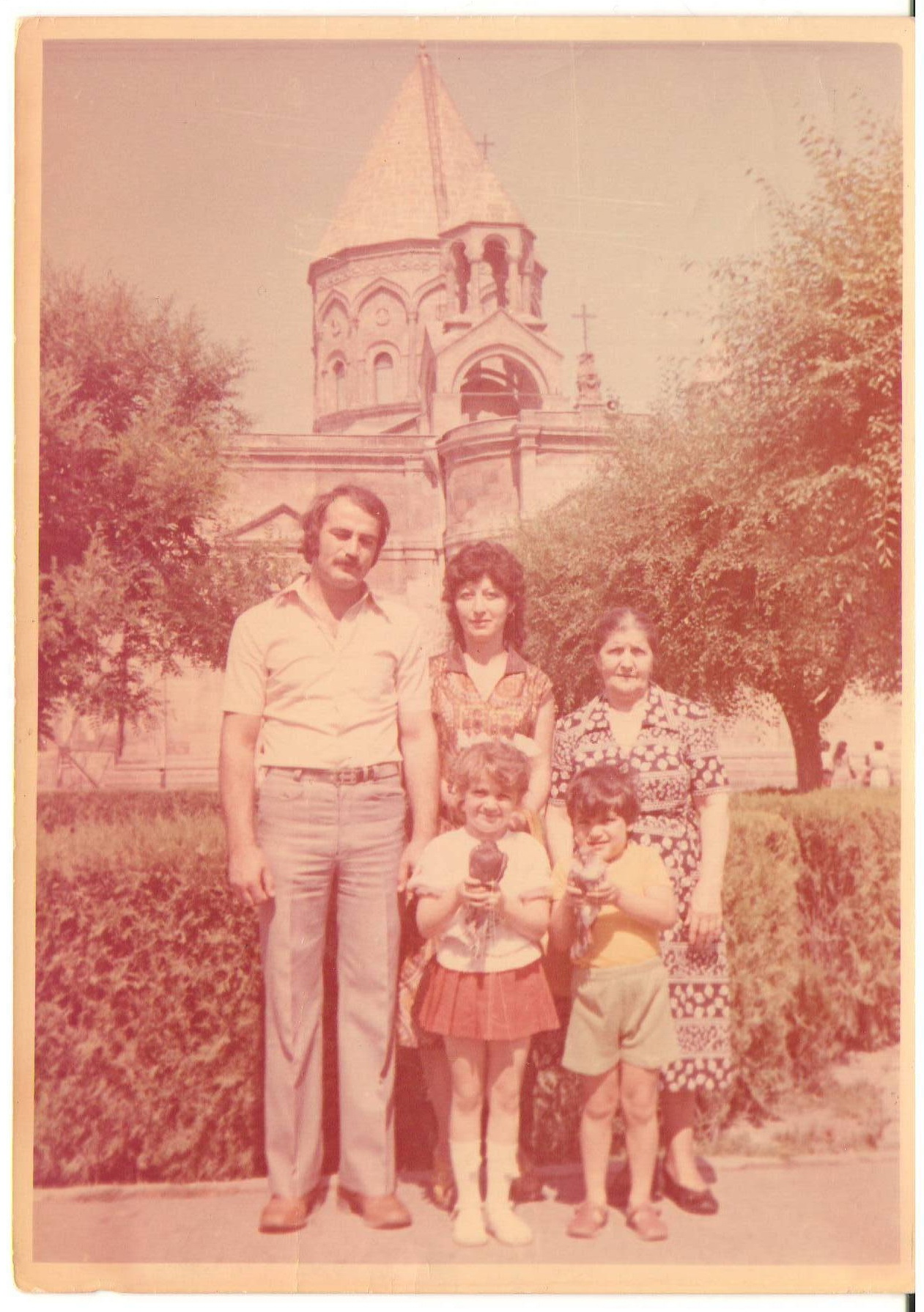 My Mother’s family was from Kars. My Mother Yelizaveta Galukyan was born in 1914. They were a very rich family and had countless gold and carpets… My Grandfather had a shop in Kars and was able to provide his family’s well-being. Mother told that their house was next to a Turkish Effendi’s house who was a revered person. Grandfather supplied him with meat every day. That Turk often asked my Grandmother to cook something with that meat for him. And my Grandmother met his request as she respected him a lot. Because there was usually too much meat the Turkish Effendi asked my Grandmother to distribute the dinner among Armenians in need, to the poor.
My Mother’s family was from Kars. My Mother Yelizaveta Galukyan was born in 1914. They were a very rich family and had countless gold and carpets… My Grandfather had a shop in Kars and was able to provide his family’s well-being. Mother told that their house was next to a Turkish Effendi’s house who was a revered person. Grandfather supplied him with meat every day. That Turk often asked my Grandmother to cook something with that meat for him. And my Grandmother met his request as she respected him a lot. Because there was usually too much meat the Turkish Effendi asked my Grandmother to distribute the dinner among Armenians in need, to the poor.
But one night an attack occurred in Kars and Mother's whole family was captured and led to be killed. Some time later the grown-up members of the family returned. As Mother told, her Grandmother said at that moment their two Turkish neighbors had come and had drawn the killers away. Those Turks had said that my Mother's family would have to flee not to be in danger. Fleeing at night, they were hardly able to get on the train for Tiflis and thought they would settle there. But when they got to Kirovakan the train stopped and an announcement was made saying that Russians had occupied Kars. Mother's family returned to Kars. After coming back they were able to live there for a few years. They kept their fortune in pitchers and jugs.
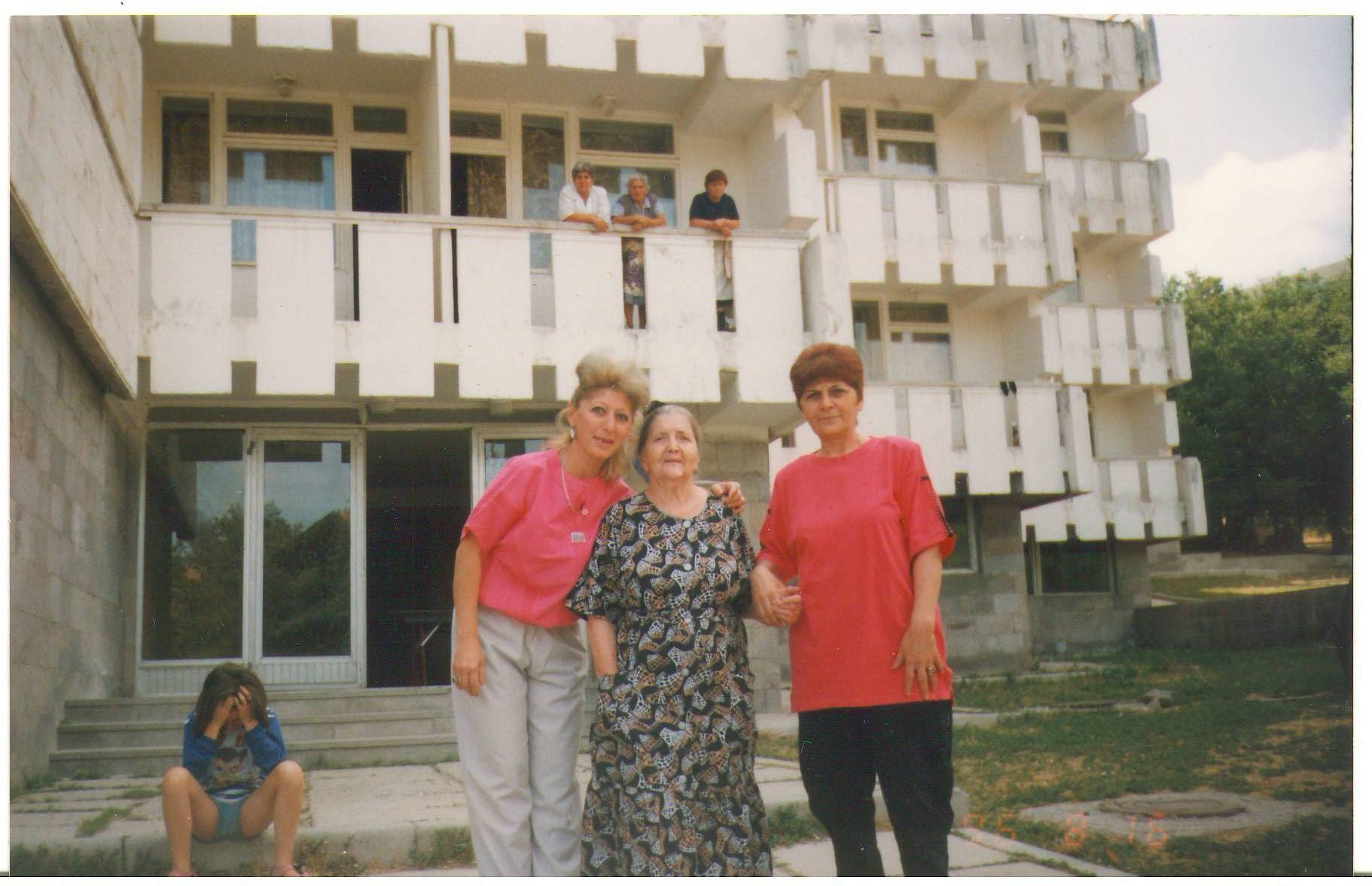 But after Kars was handed to Turkey by Lenin, even more violent massacres raged against Armenians. This time my Mother's family fled and settled in Gyumri. Mother told that during the killings, before her eyes, a pregnant woman's abdomen was cut open and the baby fell out... The attitude to Armenians was generally rather rude, which had made a great impression on my Mother who was still a little child then.
But after Kars was handed to Turkey by Lenin, even more violent massacres raged against Armenians. This time my Mother's family fled and settled in Gyumri. Mother told that during the killings, before her eyes, a pregnant woman's abdomen was cut open and the baby fell out... The attitude to Armenians was generally rather rude, which had made a great impression on my Mother who was still a little child then.
During the escapemy grandmother managed to put only a few pieces of jewelry on the children or tie on their bodies. They were able to bring with them to Armenia only that and it turned out to be very helpful for them further. They settled in Gyumri and managed to support themselves through selling it until my Mother got married and then already my Father started to support the family. My Father was from Alaskert, Mush and was 14 years older than my Mother. Father fought in Andranik's battalion. His brother fought in the Turkish army and was a respected person. My Father started to work for an international humanitarian foundation and settled in Hoktemberyan taking the whole family with him. And that is where I was born. They had five sons and one daughter but three of the sons died. My Mother said if she had an opportunity to go back she would be able to find the gold hidden in pitchers in the ground as she remembered its place...
"I Dream to Go to Kars at Least Once, to See my House and Then Die..."
Tells Ruben Sargsyan
My Grandfather, Melik Sargsyan, was from Kars. He was born in 1895; at least that was written in his documents, although he insisted that he was born in 1888. I was 13 when I heard his story from my Grandfather. I was so much interested that even recorded my Grandmother's and Grandfather's stories. They used to tell their stories and, full of nostalgia, sometimes sang passages from national songs in their own dialects. Unfortunately, thoses recordings have disappeared from our family archives.
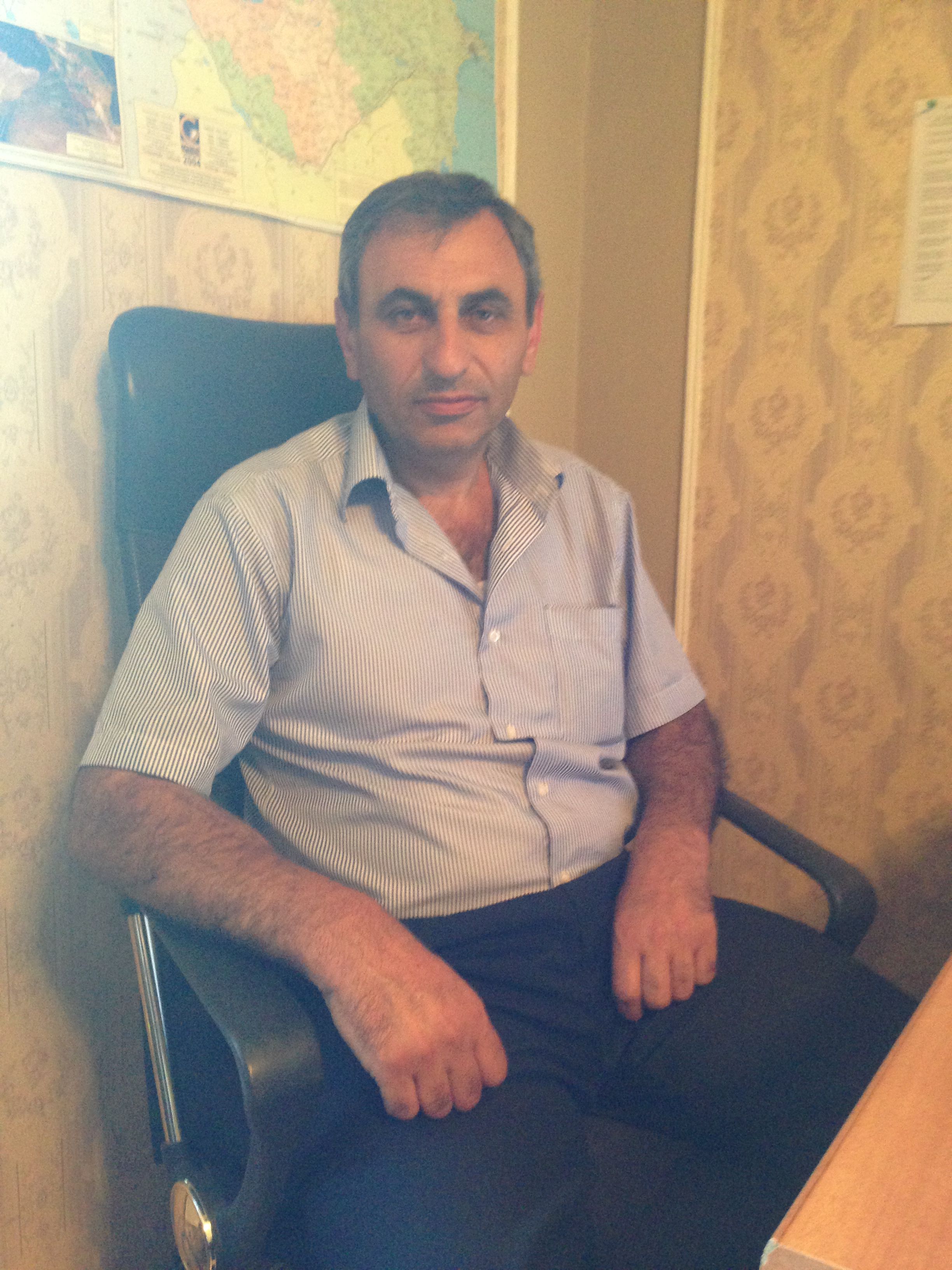
My Grandfather's ancestors came from Sasun, and then they migrated to Mush, from there to Kars. My Grandfathers migrated from Sasun because of an argument with Kurds. One day a Kurd came to our house in Sasun, stopped his horse in our yard and began to put the overspread wheat into the saddlebags on the horse. In answer to the owners' indignation he said, ''Armenians must work so that Kurds eat''. The furious landlords hit the uninvited guest with a stick for yoking oxen and he died. Fearing revenge of the killed Kurd, my ancestors paid to other Kurds to take them away from Sasun secretly. Thus, they migrated to territories under the Russian government.
My Grandfather told that one day in 1921 he noticed a Soviet train arriving in Kars. As he said, he recognized the Russian train by the "comunalka" [communal, tr.] caps of the Russian soldiers. My Grandfather recognized the Russian commandant of the train. As they found out they had served in the 5th regiment of the Bolshevik army together. My Grandfather told the Russian commandant that he wanted to run away and get to Gyumry by train. The commandant promised to transport him secretly. But somebody overheard their conversation and told the Turk Pasha that Melik was going to escape by the Russian train. When Turk gendarmes brought my Grandfather to Pasha my Grandfather didn’t hide anything and confessed that he wanted to go away to his survived relatives. My Grandfather even tried to take an Armenian young woman he didn’t know but introduced her to Pasha as his wife.
Amazingly, though, instead of punishing my Grandfather Pasha gave him money and let free. This is how my Grandfather came to the Caucasus, lived in Tiflis for some time, then settled in Gyumri where he found his brothers. Then they all moved to Yerevan. Here my Grandfather married my Grandmother Jaghut, who had also run away from Western Armenia and had had a narrow escape.
My Grandmother told that Turk soldiers had gathered all the inhabitants of their village in a building, if I am not mistaken in the church, put haycocks around and set fire. But, fortunately, local Pasha happened to be passing by that very place and ordered the soldiers to free the people. This is how my Grandmother was rescued.
My Grandfather was a carpenter and continued his work here. My Grandfather’s Father Khachatur, who was killed during the Genocide, also used to have the same craft. He disappeared in winter and was found only months later in the gorge after the thaw. My Great Grandfather was identified by his coat.
My Grandfather made the decision to move to Eastern Armenia quite late. I know he had earlier been also to Russia. He made the decision to migrate from Kars and move to the Soviet Armenia only after he had understood that Kars was yielding. All his relatives, including his Mother and two brothers had left Kars earlier, moving to Tiflis, others to Guymri. Noteworthy to say, that many people had moved to Guymri in the hope that it was close and as soon as Kars was released, they would return to their town, their homes.
Every time he remembered his story my Grandfather would say, "I dream to go to Kars at least once, to see my house and then die."
"My Grandfather Had Several Turk Friends, Thanks to One of Whom He Survived the Great Massacre"
Tells Alis Manukyan-Minasyan
My Grandfather – my Mother’s Father – whose name was Martiros Kavtaryan, was from the town of Akn. The location of this town is very interesting. It is surrounded by mountains. A large number of Armenians lived in Akn. My Grandfather had a shoemaking factory where several Turks worked. Besides the staff, my Grandfather also had quite many Turkish friends, some of whom were his partners.
 During the years of the massacre my Grandfather was already married. My uncles were already born. It was due to his work that my Grandfather had good acquaintances among Turks. One day a Turkish friend of his came and said, "Martiros, you had better leave this place. Take your family and go away."
During the years of the massacre my Grandfather was already married. My uncles were already born. It was due to his work that my Grandfather had good acquaintances among Turks. One day a Turkish friend of his came and said, "Martiros, you had better leave this place. Take your family and go away."
Fortunately, my Grandfather listened to his Turkish friend and left Akn with his family. They went to Bulgaria. Some time later after he had left Akn with his family, Grandfather heard the news that all the Armenians in Akn were assassinated.
So my Grandfather’s family managed to avoid the massacres thanks to a Turkish friend.
My Mother was born in Bulgaria, in Varna.
"A Number of Armenian Children Owe Their Salvation to the Turkish Commander"
Tells Manvel Ghumashyan
I have heard this story from my Grandmother Narigyul Gharagyozyan, whose father Yesayi Gharagyozyan lived in a village nearby Turkish settlement Yozlat. He was an officer in the Turkish army. In the days of the massacres his Turkish commander, who was also his fellow village resident (unfortunately, I can’t remember his name), called Yesayi and advised to convert his religion so that he could save his family. Yesayi refused the offer but asked the commander to save his family. The commander, because he respected Yesayi greatly, promised to rescue the children but promised nothing concerning the adults making it clear that it was beyond his powers.
So, before the manslaughter began my Grandmother, as well as her sister and brother were moved to the commander’s house.
Unfortunately, other members of the family weren’t able to stay alive.
After taking care of the children for a few months, the Turkish commander took them to an American orphanage. Later they appeared in Greece where my Grandmother got married and tried to start a new life.
It is very interesting that about 20 years ago, when my Grandmother was no longer alive, at an event organized in the Armenian community in Buenos Aires a man came up to me. He had learned that I am Narigyul Gharagyozyan’s grandson and, approaching me, said with a trembling voice that he owed his salvation to my Grandmother. Of course, I didn’t understand what he meant but everything became clear soon when he told me the following story.
During the attack on the village a group of children (some 4-5 of them) managed to run away and hide in a cave in the nearby gorge. Some time later, my Grandmother, Narigyul Gharagyozyan, learnt about the hiding place of those children and began to provide the starving and exhausted children with food at nights, thus rescuing them from death of famine. Naturally, my Grandmother couldn’t have done that without the consent of her Turkish host.
"It was Dangerous to Live in a Turkish Friend’s House Long"
Tells Izabella Chplakhyan
That little girl in the photo is me – with my Grandmother and Grandfather. My reminiscences of my Grandfather are rather vivid. I can still remember also that he never liked talking about his youth. The reminiscences of that time of his life were the most painful. My Grandmother, who was also, unfortunately, a witness of the Genocide, told us about what had happened to him. Unlike my Grandfather, she found strength to talk about that.
My Grandfather was born in the province of Yoghat in 1900 and had six brothers and one sister. During the Genocide his brothers and parents were cruelly assassinated. My Grandfather was saved by a Turk friend of his father’s and was kept at his house for some time. However, it was impossible to stay in that house permanently; there was a huge danger for that family as well. Some time later my Grandfather escaped to Armenia – Yeraskh village, Ararat region. My Grandfather’s sister also survived the Genocide, but I don’t know the details of her story. I just know that she somehow managed to go to Beirut. We learnt about that only many years later, when both my Grandfather and his sister were very old. Unfortunately, they never had a chance to meet.
Our original family name was Baljyan. During the move my Grandfather was asked his surname and he, looking at his half-naked body, said, "I am naked [chplakh, tr.], so write Chplakhyan". And he got to Armenia with that very surname.
"Many Armenians Were Slaughtered in Bitlis but My Grand-Grandfather’s Family Managed to Survive the Massacres"
Tells Harutyun Berberyan
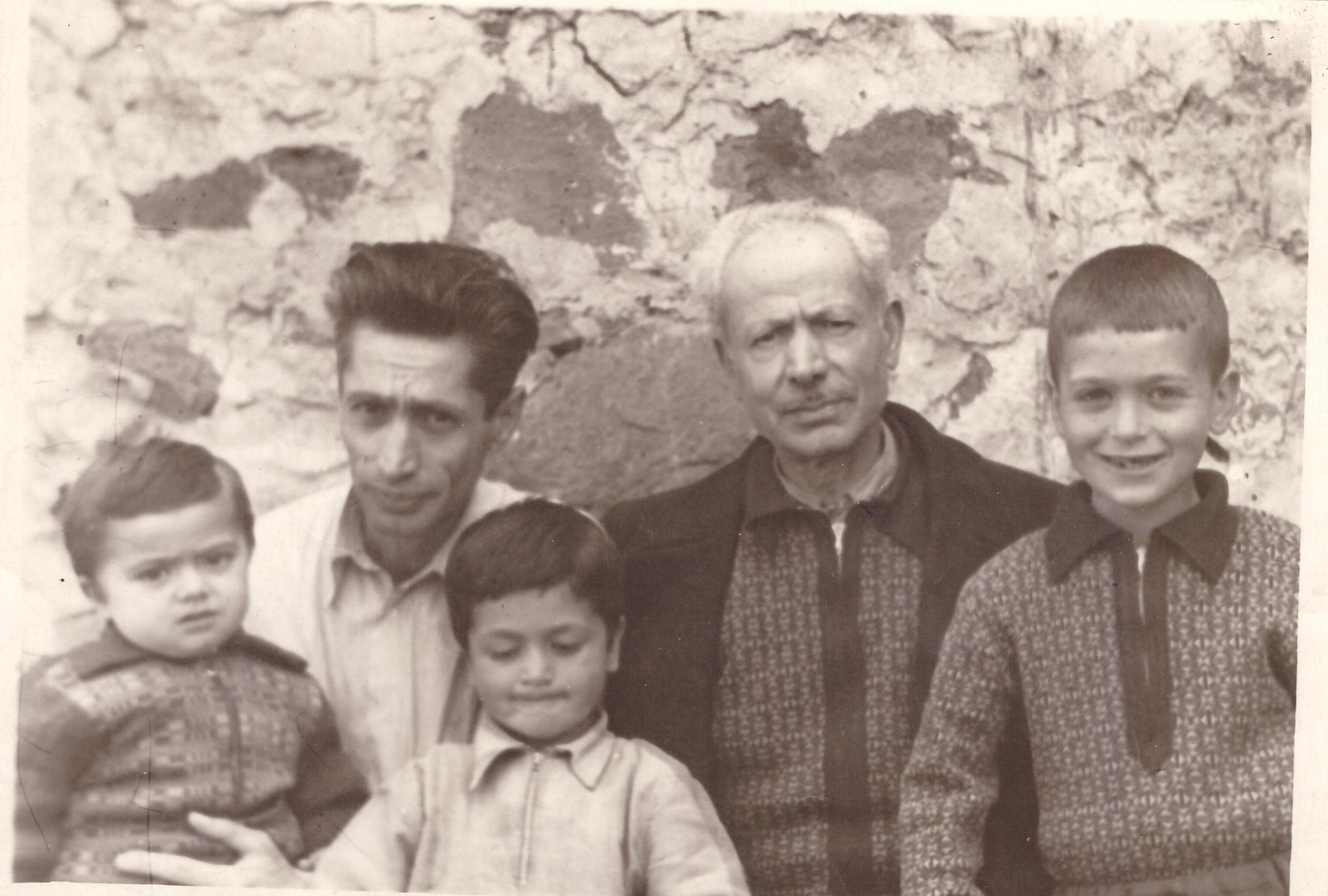 In my family both my Mother’s and Father’s families migrated in result of the Genocide. I can still remember how during our childhood besides fairy tales our grandparents told us also about their migration, their salvation and stories of their past. We heard those stories so many times but every time they sounded differently with new and interesting details and reminiscences. The main aim of that was to make us remember these stories and never to forget.
In my family both my Mother’s and Father’s families migrated in result of the Genocide. I can still remember how during our childhood besides fairy tales our grandparents told us also about their migration, their salvation and stories of their past. We heard those stories so many times but every time they sounded differently with new and interesting details and reminiscences. The main aim of that was to make us remember these stories and never to forget.
My Father’s Grandfather Yeghish migrated from Bitlis with all his family if I am not mistaken right before the massacres of 1915. He was involved in shoemaking in Bitlis. Our original family name used to be Yeghiazaryan (or Ter-Yeghiazaryan) but everybody called them Ghpeyants. When crossing the border during the escape that name Ghpeyants was made into Kpeyants because of the pronunciation of Russian border guards.
The story how my Grand-grandfather and his family survived is rather interesting because, as you know, many Armenians were slaughtered in Bitlis. My Grand-grandfather, being a man of great opportunities, had several friends among Turks and Kurds. A Turkish acquaintance of his warned him about all that before the massacres of 1915, thanks to which my Father’s Grandfather was able to survive bringing all his family and his dead brother’s sons to Armenia. Grand-grandfather had three sons and five daughters. My Grandfather Nikol was the second son of the family and the eldest son Ashot fell off the cart during the exile and was lost.
As Grand-grandfather had been warned about the danger he had enough time to take some of his possessions and to set off on the road of refuge. Thus, he was able to bring certain things to Armenia. Coming to Yerevan their family settled here and started a new life.
"My Mother’s Grandfather Loved a Turkish Girl and Running away from the Army Went to Their House"
Tells Anjela Khachatryan
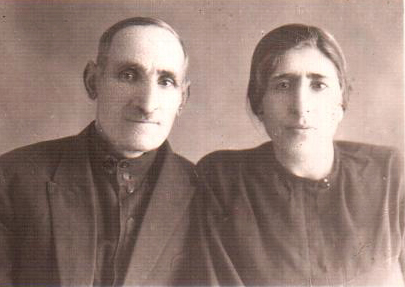 My Mother’s Grandfather was from Erzurum. After the Genocide he changed his name Kamer Varderesyan into Armen Varderesyan.
My Mother’s Grandfather was from Erzurum. After the Genocide he changed his name Kamer Varderesyan into Armen Varderesyan.
Before the Genocide he served in the Turkish army. They had a big family consisting of 31 members. They all lived next to each other, in one yard.
During the atrocities of 1914, when still in the army, he learned that all members of his family were killed. My Mother's Grandfather ran from the Turkish army simply in a Turkish uniform.
He loved a Turkish girl and went to their house. That girl’s parents didn’t let him go as they knew he was an Armenian and could be killed. They kept him in their house hiding under the sofa. After it got dark they helped him reach the border and he ran to Russia.
Ten years later, when he learned that in Tiflis he had relatives who had run away from Turkey, Mother’s Grandfather moved to Georgia.
My Aunt tells that her Grandfather loved Turkish music and spoke the language fluently. He considered Western Armenia his country and used to say, "If the border is open I will go there on my knees, I will see my house."
"What Was the Fault of the Poor Armenian Nation..."
The material was provided by Anahit Berberyan
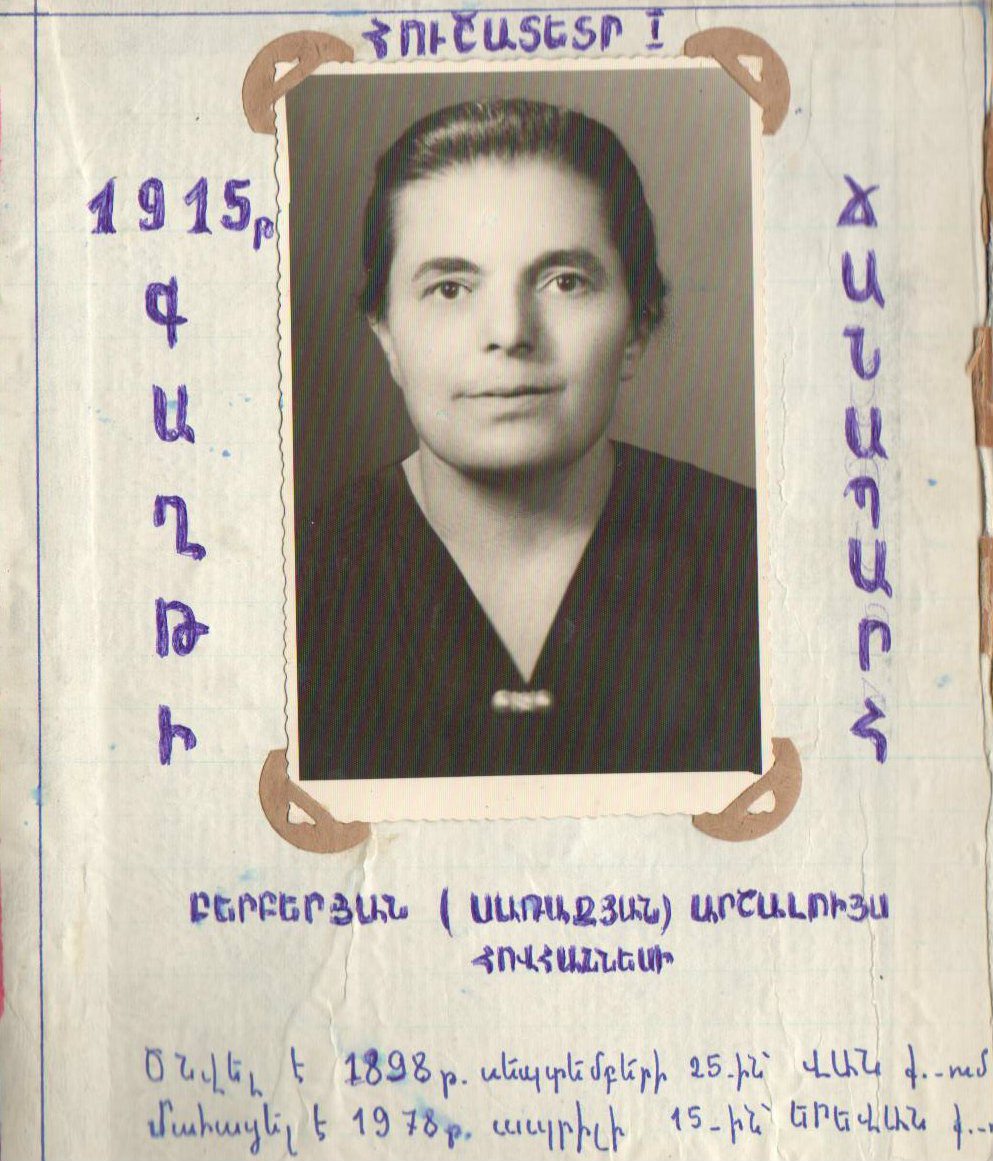 My Grandmother Arshaluys Berberyan (Sarajyan) Hovhannes was born in Van in 1898, lived in Tehran and died in Yerevan in 1978. She collected her reminiscences in two big notebooks and called them "On the Edge of My Life".
My Grandmother Arshaluys Berberyan (Sarajyan) Hovhannes was born in Van in 1898, lived in Tehran and died in Yerevan in 1978. She collected her reminiscences in two big notebooks and called them "On the Edge of My Life".
I cite passages from her notebook.
"On July 15, 1915 we, the inhabitants of Van, left our birthplace and our native country, our homes and houses, the sweet air and water, turned into a toy in the hands of destiny, set off on the black road of exile and went from country to country like tramps; like a storm-hit ship we were smashed upon one rock then another and, in the end, the broken ship took us to some unknown, alien shores.
Every time I remember my birthplace Van I can feel some kind of murmur in the deepest part of my heart as if cold water were poured on hot fire, and I remember my happy days with so much pity.
We set out and left behind our dearest Lake Van that wept, sobbed like an abandoned orphan and called us as if saying "take me with you, I won’t stay without you, but how can I stay without you…"
We had heard so much about the hell with its awful sides in tales, but who could imagine that one day we were to see inferno with our own eyes and were to feel on our own skin hell in its full depth, unspeakable torture and sufferings. I thought they say the hell was only for those evil and sinful; then what was this poor Armenian nation guilty in to live those black and severe days.
Among all that fuss and rush I lost my Mother and sisters but kept walking with others. We reached Berkry. We were going by a narrow path through the mountains. Suddenly we heard shoots. The terrific enemy had come down the mountain, cut the passage of the caravan and had started to massacre ruthlessly, to kidnap young girls. The crowd was screaming in panic, tearing hair. At that wild moment I had a glance of the river flowing below and, oh, what is that… Hundreds of bodies are rolling in the river and floating away. Armenian women, Armenian young girls, keeping tight to honor and pride preferred to be swallowed by the waves of the river than get into the hands of the vile and lawless enemy.
We were mad of awfulness; we were running horrified and breathless and we didn’t know where. We went on for five or six days hungry and exhausted. Mothers hopelessly left their children on the road but volunteers followed them in carts, collected everybody, put into carts and again followed the people.
My feet hurt and were swollen like logs; I could no longer walk. The crowd came and passed by. Tears of thousands like me reached the sky. What should I do? I was sitting beside the road crying hopelessly and bitterly and was looking at my sick feet thinking about my desperate situation when suddenly I heard some ringing and saw a caravan. I was scared to see Muslims but one of them brought his camel near, the clever animal kneeled and I got on it. I kept tight to the camel and with two arms held the unknown woman in front of me by her waist, who turned round and said, "Don’t fear, balés [bales means my baby, tr.]". She had lost her own children among the refugees. The caravan of camels kept going ringing the bells and taking so many helpless. We had already covered quite a long distance when a cameleer said something to another, who took some bread out of a bundle and handed to us.
I was so touched by the honesty of that stranger that forgot about the awful pain of my feet and thought anyone had that "voice of consciousness" whether Christian or Muslim. It is only ignorance that has ruled the humanity for centuries and has now become the cause of this huge and terrific disaster…"
The caravan brought that woman and my Grandmother to the crowd of refugees. After long wanderings and sufferings Grandmother was able to find her relatives. They had a narrow escape and in the end came to Yerevan.
"My Grandmother Was Saved by Hiding in the Tandoor…"
Tells Anahit Harutyunyan
 I – Anahit Harutyunyan – was born in the family of refugees. My Father’s parents migrated from Shatakhi and my Mother’s parents from the village of Gavash, Van (Mother) and Bitlis (Father).
I – Anahit Harutyunyan – was born in the family of refugees. My Father’s parents migrated from Shatakhi and my Mother’s parents from the village of Gavash, Van (Mother) and Bitlis (Father).
I would like to tell the story of my Grandmother Rehan from mother’s side.
My Grandmother was a very beautiful woman. Marutyan Rehan Manuk was born in the early 1900s, she couldn’t clearly remember the exact date. She didn’t attend school but was a very wise woman; she could remember so many tales and spoke the dialect of Van until her death. Her family was busy in cattle breeding and was very rich.
Along with Armenians Turks, Kurds, Yezidis lived in Gavash village. They lived peacefully, sharing happiness and pain.
As Turkey’s subjects they paid taxes every month but in due course tax-raising got rather cruel forms. Particularly Christians suffered from this tax-raising. Tax collectors appeared unexpectedly. They took beautiful Armenian children, gold, carpets, valuables, wheat, other food. They ruthlessly killed anyone who tried to resist. When tax collectors appeared all Christians avoided meeting them. Parents constantly warned my Grandmother and other children to hurry home as soon as soldiers appeared.
One day, when tax collectors appeared, the parents hurriedly sent my Grandmother and other children to their Muslim neighbor's house (she couldn't remember whether those neighbors were Kurds or Turks). They put ash on the children's faces, tousled their hair and put down into the tandoor. The tandoor was closed, the elder woman of the family put carpets on the tandoor and laid the table as if they were having dinner, so that the policemen noticed nothing. The neighbor's children thought it was a kind of game and they started to cry saying, "Put ash also on our faces, put us also down the tandoor." Fortunately the gendarmes didn't understand anything...
So, thanks to their Muslim neighbors, my Grandmother and her brothers and sisters avoided getting into the tax collectors' hands.
According to the Armenian tradition, bashikyartma[1] was made for my Grandmother. Her fiancé was recruited to the Turkish army. One day the news came that he and Armenian young people from that village recruited to the army were murdered. After receiving the news the Armenians realized that their lives were also in danger. Most of the Armenian families decided to leave the village. Armenian families were very large but only a few managed to survive the roads of stampede. Rehan was among those.
On the way of flight, followed by armed squads Armenian families were parted, they broke up, some members died unable to resist the privations of the roads, hunger, thirst. My Grandmother also lost her parents and relatives on the way. Because of the calamities of the roads one thought prevailed in the minds of people, "We are followed, we must make out." They walked for days without sleep, without rest. My Granny said the wish to lie down, to sleep was rather big but they couldn’t. My Grandmother once even said, "Leave me here, you go…" but her relatives didn’t leave her.
Many of the adults died on the way of exile. My 12-13 years’ old Grandmother and other children took care of the younger children who remained with them, carried them on their backs or arms. But sometimes, because of the privations of the roads and physical fatigue they had to put the youngers near big stones, among hills, in the shadow of some bushes leaving pokhindz [pokhindz is roasted, ground wheat flour, a bit darker than regular flour, with bigger grains, tr.] made with sugar syrup and went on without turning back, with tears in their eyes… My Grandmother always said she could still hear the voices of the children crying and shouting behind them who yelled, "Take us with you, don’t leave us here." But she was a child herself and couldn’t help them…
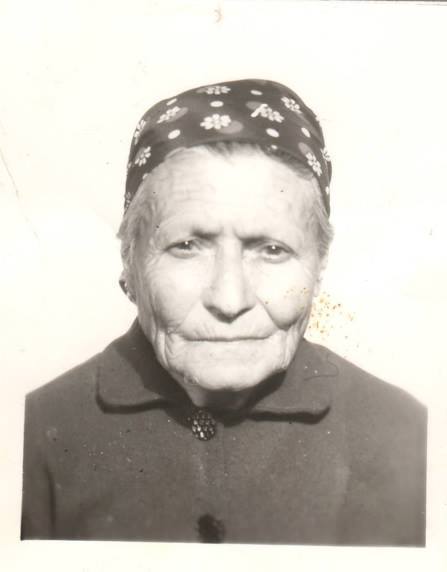 In Eastern Armenia they were accommodated in the village of Karpi, modern Aragatsotn region. Her dead fiancé’s mother (mother-in-law) found her here and brought her up. When my Grandmother was 15-16 her mother-in-law married her to my Gurgen Grandfather who was a soldier of Andranik’s. Through various links my Grandmother managed to find Manuk, her brother’s survived son.
In Eastern Armenia they were accommodated in the village of Karpi, modern Aragatsotn region. Her dead fiancé’s mother (mother-in-law) found her here and brought her up. When my Grandmother was 15-16 her mother-in-law married her to my Gurgen Grandfather who was a soldier of Andranik’s. Through various links my Grandmother managed to find Manuk, her brother’s survived son.
My Grandmother Rehan was very reserved and didn’t want to speak on that topic. Every time we asked her questions she avoided answering afraid of the repressions of the Soviet times.
We never heard from my Grandmother’s relatives who remained in their village…
Grandmother had 12 children 6 of whom died. She used to say, "Bala jan [My dear child, tr.], I have fairly shared my children with God: I have given six to Him and kept six for me." They named all their children after their relatives killed, slaughtered during the flight.
Granny always said, "I wish doors would open, those borders would open, I could go to my Ergir [Country, tr.]…"
Grandmother didn’t even want to tell all this. We were hardly able to persuade her to tell.
She was a woman loving God and order very much. She would get up early in the morning and wouldn’t exchange a word with anyone. She would silently wash, go out into the balcony, pray looking at the sunrise and only after that she would greet us. And when we asked why she did so she would say, "How can I greet you without saying a prayer first?"
She cried quite often saying, "Eh, bales [child, tr.], I wish I knew what happened to my Father, my Mother, my brothers and sisters, where they remained."
[1] The old tradition of engaging minors. Sometimes even babies were engaged. They got married after coming of age.
"My Grand Mother Grew up in a Turkish Family"
Tells Seda Avedikyan
My Grand Mother, Ozheni Torosyan, was only three years old during the massacres. She and her family lived in the village of Burunkishla, Yozghat district, Turkey. In result of the massacres my Grandmother lost all her family – her mother, father and brother. She herself survived by miracle. Her parents, clearly realizing they would be killed, wrapped the child in a matting and hung on a tree hoping that somebody would notice the child and would save her. Fortunately, another Armenian family noticed the child and took her with them. However, realizing they wouldn’t manage to avoid the atrocities, they gave the child to a Turkish family promising to return and take her. Unfortunately, none of that family members returned.
Thus, Ozheni Torosyan grew up in a Turkish family. Her named was changed so that nobody in the village could understand she was Armenian.
Years later that Turkish family migrated to a village in Sebastia district. One day an Armenian miller came to that village for trade. It is of interest to note that many Armenian millers managed to survive the massacres thanks to their professional skills that were useful for the Turks. Learning that an Armenian girl was living in that village, the miller decided to meet my Grandmother and promised to take her to the town. They arranged to meet secretly at night. Besides my Grand Mother, there was another Armenian girl in that village but she refused to run away with the miller as she was afraid of being caught.
As Armenian churches, schools and orphanages in Sebastia were also destroyed Armenian families living in the town took orphans to their homes. So my Grand Mother started living with the Armenian miller’s family.
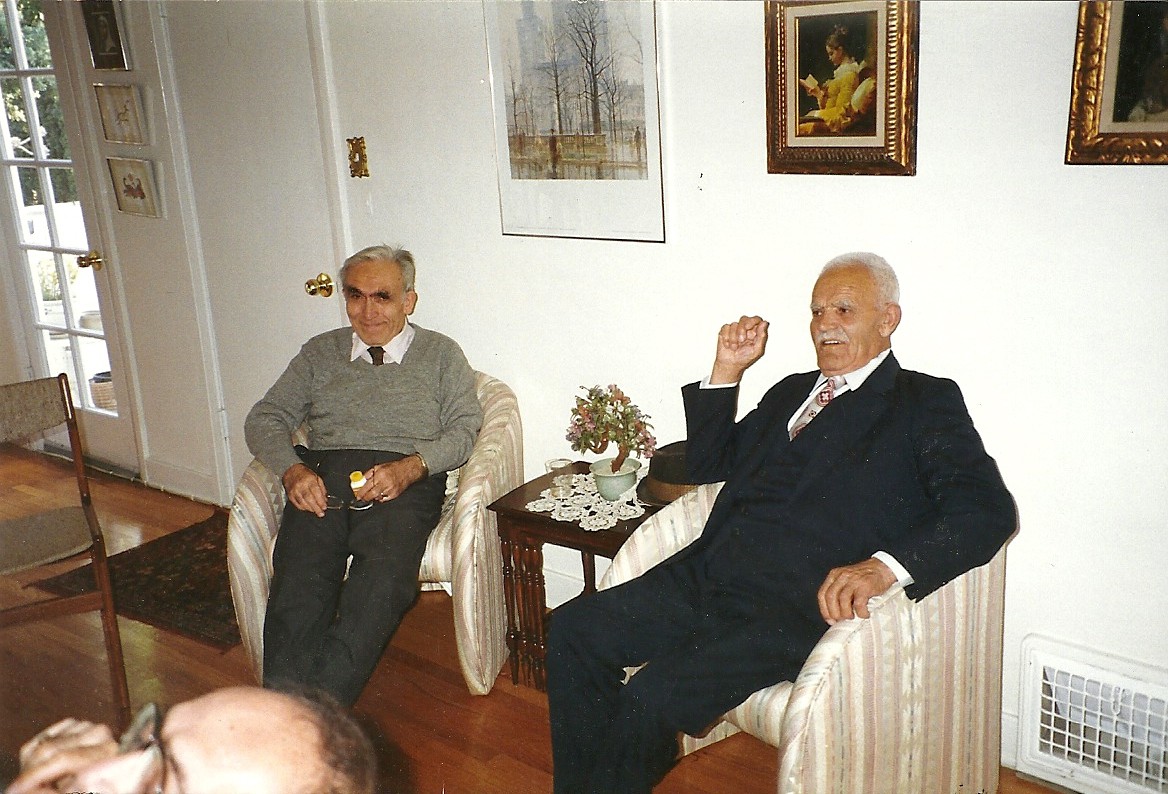 My Grand Mother was a fifteen-year-old beautiful girl with white skin, black hair and blue eyes when she met my Grand Father – Vahan Mamprelyan, who had also managed to survive the massacre thanks to another Turkish family. During the atrocities my Grand Father was fifteen. He was in Sebastia and studied at Aramyan College. The Turkish family that saved him kept the boy in a tunnel for quite a long time, being able to provide him only with food all the time.
My Grand Mother was a fifteen-year-old beautiful girl with white skin, black hair and blue eyes when she met my Grand Father – Vahan Mamprelyan, who had also managed to survive the massacre thanks to another Turkish family. During the atrocities my Grand Father was fifteen. He was in Sebastia and studied at Aramyan College. The Turkish family that saved him kept the boy in a tunnel for quite a long time, being able to provide him only with food all the time.
Thus, two Armenians who had miraculously outlived the massacres – Ozheni Torosyan and Vahan Mamprelyan – were brought together by fate and married. Later my Grand Father, interested in the story of my Grand Mother’s origin, went to Burunkishla village where the family that had saved my Granny lived and tried to get some information about Grandmother’s parents. He was able to collect all the information about the Torosyan family. Then he wrote letters to all churches hoping to find at least someone of my Grandmother’s survived relatives. A letter came from the church in Kesaria saying that my Grand Mother’s uncle’s (father’s brother) son had survived and was in Kesaria. My Grandfather and Grandmother went to Kesaria. There, Grandmother met her cousin and through him was able to establish contact with all other survived relatives. Thus, summing up the story of my Grand Mother’s life, I can only note that she, despite all the hardships she went through, managed to survive two times: the first time when she was hung on a tree and didn’t die and the second time thanks to a Turkish family.
I am proud that the privations of her life made my Grand Mother not weak but powerful.
She continued to live happily with my Grand Father, had four children, several grandchildren and died at the age of ninety.
Other materials on this subject
- FM of Luxembourg Visited Armenian Genocide Memorial Asselborn has arrived in Armenia for an official visit at the invitation of Armenian Foreign Minister Edward Nalbandian. He will have meetings with Armenia’s President Serzh Sargsyan and will visit the...
- An Armenian Living in Turkey: The Events of 1915 Cannot Be Forgotten What refers to the future, then I hope that the Armenians and Turks will reconcile in the end. The problem is between the governments and they must resolve it
- Armenian Living in Turkey: Advocacy for Brotherhood Should Be Done at the State Level to Sound More Convincing The country already has problems connected with human rights and freedom of expression, which for Armenians are doubled.
- French Senate Will Discuss Bill Criminalizing Armenian Genocide Denial in Early October "We work in order the required number of MPs to vote for the bill. You know the Turks are not indifferent, they also work, do everything in order that option not to be adopted."
- Genocide Education Bill in the US State Michigan Signed into Law "I am elated we finally accomplished making this important genocide educational program into Michigan law," Jamian said. "This success demonstrates that when our community leaders all work together we...
-
 17:08
17:08The regular session of the Anti-corruption Policy Council takes place in Jermuk
-
 15:05
15:05The Prime Minister sends congratulatory messages to the supreme leader of Iran and the President of Iran
-
 11:11
11:11Armenia sends earthquake aid to Turkey
-
 10:43
10:43Commemoration of the Pontiff St. Sahak Partev
-
 09:16
09:16Some roads are closed and difficult to pass in Armenia
-
 19:55
19:55Phone conversation of the Foreign Minister of Armenia with the U.S. Assistant Secretary of State for European and Eurasian Affairs
-
 18:30
18:30Prime Minister Pashinyan and President Khachaturyan meet
-
 18:20
18:20Ararat Mirzoyan with Co-Chairman of the OSCE Minsk Group of France Brice Roquefeuil
-
 17:01
17:01Humans could land on Mars within 10 years, Musk predicts
-
 16:45
16:45France, US urge 'immediate' end to Nagorno Karabakh blockade
-
 16:01
16:01Blockaded Nagorno Karabakh launches fundraiser to support quake-hit Syria
-
 15:59
15:59Earthquake death toll in Turkey rises to 18,342
-
 15:43
15:43Ararat Mirzoyan Held a Telephone Conversation with Sergey Lavrov
-
 15:06
15:06French president rules out fighter jet supplies to Ukraine in near future
-
 14:47
14:475 Day Weather Forecast in Armenia
-
 14:44
14:44President Vahagn Khachaturyan wrote a note in the book of condolences opened in the Embassy of Syria in Armenia
-
 14:20
14:20Azerbaijan’s provocations impede establishment of peace and stability – Armenian FM tells Russian Co-Chair of OSCE MG
-
 12:57
12:57France representation to OSCE: Paris calls on Azerbaijan to restore freedom of movement through Lachin corridor
-
 11:40
11:40Command of Kosovo forces highly appreciated preparation of Armenian peacekeepers
-
 10:16
10:16The United States withdrew from sanctions against Syria for six months the provision of assistance after the earthquake
day
week
month
Humidity: %
Wind: km/h

